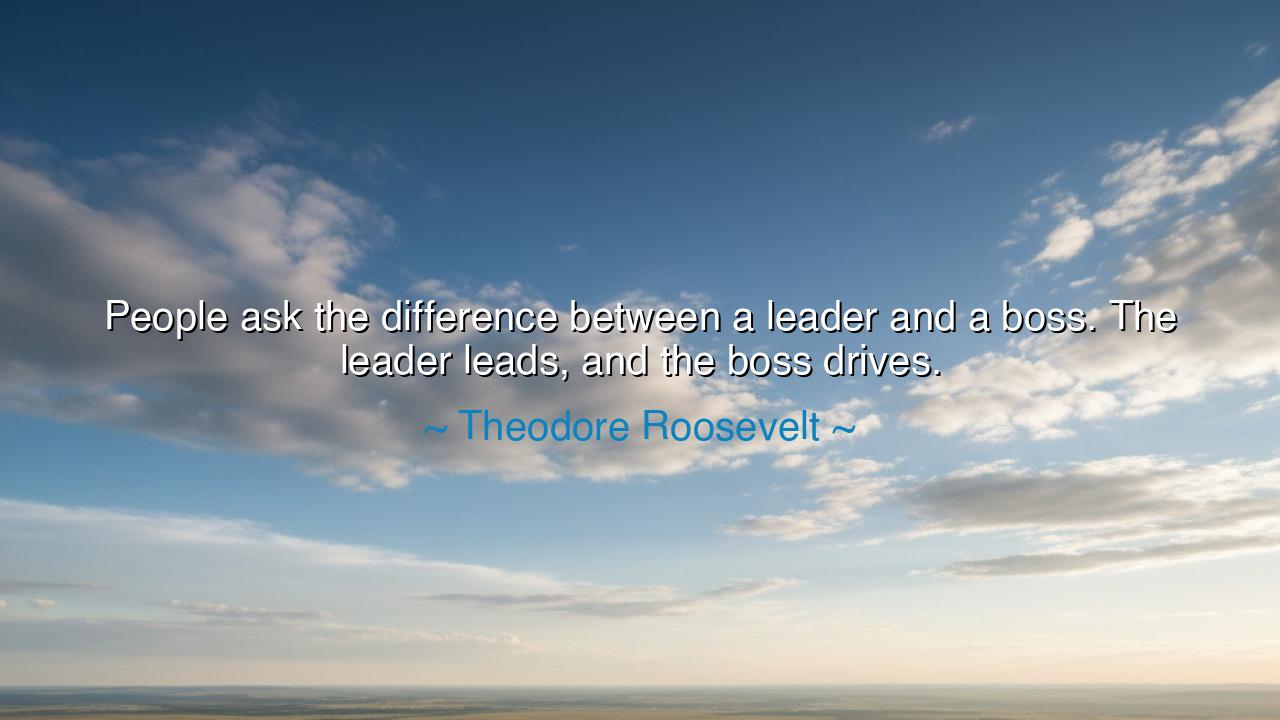
People ask the difference between a leader and a boss. The leader
People ask the difference between a leader and a boss. The leader leads, and the boss drives.






The words of Theodore Roosevelt, “People ask the difference between a leader and a boss. The leader leads, and the boss drives,” thunder with clarity and conviction, as though spoken on the battlefield of life itself. In these words, Roosevelt—warrior, statesman, and reformer—reveals the eternal divide between two kinds of authority: the authority of fear, and the authority of example. A boss compels with force, with orders, with the lash of command. A leader, by contrast, inspires through action, through courage, through the vision of one who walks ahead rather than pushing from behind.
The ancients themselves knew this truth. In the legions of Rome, a commander who stood far in the rear, barking orders while others bled, won no loyalty from his men. But a general who took the front lines, who carried the same dust on his face and the same wounds on his body as his soldiers, earned their undying devotion. To lead is to say, “Come with me.” To drive is to say, “Go without me.” The difference is not only in method, but in the very soul of the one who holds power.
Roosevelt himself lived as one who led. On the battlefield of San Juan Hill, he did not remain behind, directing others. He charged forward, riding with his Rough Riders into fire and fury. His courage drew others forward, not because he demanded it, but because his own actions blazed the path. This is the essence of the leader—to embody the courage, endurance, and labor that one asks of others. A boss commands; a leader inspires.
History gives us countless examples. Consider the difference between Napoleon Bonaparte and King Louis XVI. Napoleon, though ruthless in ambition, marched with his soldiers, ate their bread, shared their dangers. His men followed him across Europe because they saw him as one of them, though raised higher by genius. Louis XVI, on the other hand, ruled with detachment, issuing decrees from gilded halls while his people starved. One led; the other drove—and the one who drove was cast down in revolution.
The meaning of Roosevelt’s words cuts deep: true authority is earned, not imposed. The boss relies on position, on title, on fear of punishment. The leader relies on respect, trust, and the willing devotion of those who see in him an example worth following. Fear compels obedience for a time, but it breeds resentment. Inspiration breeds loyalty, and loyalty outlives fear.
The lesson for us is clear. In our families, in our work, in our communities, we face the choice: will we lead, or will we drive? Will we demand without giving, or will we embody the very spirit we hope to awaken in others? If we wish to be leaders, we must walk the path ourselves. We must show patience if we ask for patience, discipline if we ask for discipline, courage if we ask for courage. Only then will others follow with willing hearts.
The practical action is this: each day, examine whether you are asking of others what you refuse yourself. If so, you are driving, not leading. Instead, commit to being the first to labor, the first to endure hardship, the first to take responsibility. Practice humility, for the leader knows he is servant as much as guide. In this way, your authority will grow not by command, but by the strength of your example.
Therefore, O listener, engrave these words of Roosevelt upon your heart: “The leader leads, and the boss drives.” Be not a driver of men, but a leader among them. For the boss rules only while his power lasts, but the leader’s influence endures in the hearts of all who walked beside him. Lead with courage, lead with vision, lead with love—and your legacy shall outlive you.






AAdministratorAdministrator
Welcome, honored guests. Please leave a comment, we will respond soon